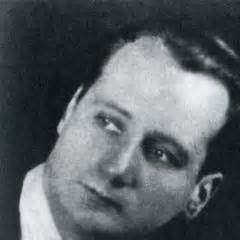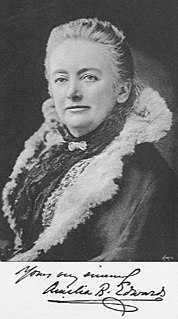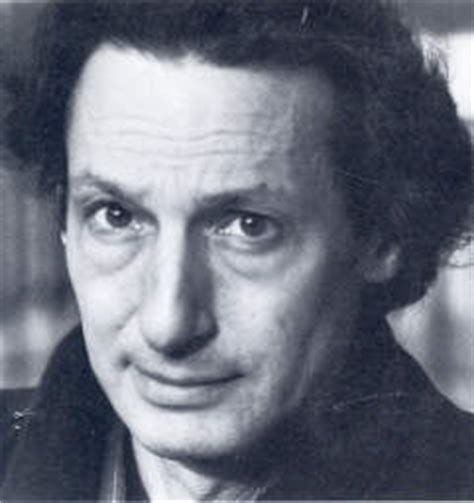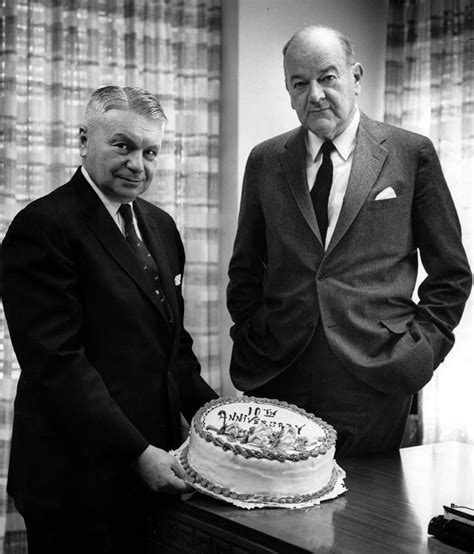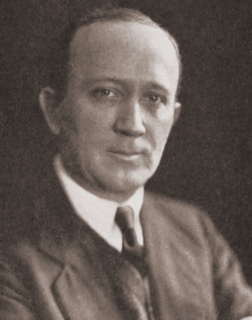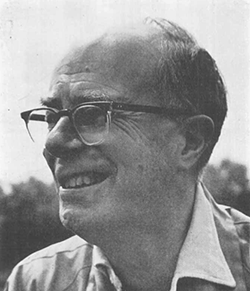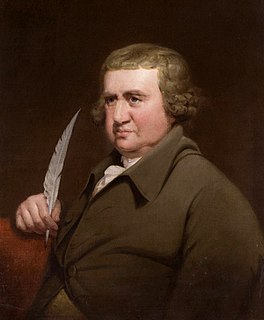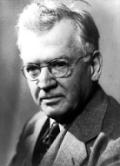Top 1200 Hence Quotes & Sayings - Page 20
Explore popular Hence quotes.
Last updated on April 20, 2025.
Anarchists know that a long period of education must precede any great fundamental change in society, hence they do not believe in vote begging, nor political campaigns, but rather in the development of self-thinking individuals. We look away from government for relief, because we know that force (legalized) invades the personal liberty of man, seizes upon the natural elements and intervenes between man and natural laws; from this exercise of force through governments flows nearly all the misery, poverty, crime and confusion existing in society.
Reasoning is compared to understanding as movement is to rest, or acquisition to possession.... Since movement always proceeds from something immovable, and ends in something at rest, hence it is that human reasoning, in the order of inquiry and discovery, proceeds from certain things absolutely understood--namely, the first principles; and, again, in the order of judgment, returns by analysis to first principles, in the light of which it examines what it has found. Now it is clear that rest and movement are not to be referred to different powers, but to one and the same.
All who say the same things do not possess them in the same manner; and hence the incomparable author of the Art of Conversation pauses with so much care to make it understood that we must not judge of the capacity of a man by the excellence of a happy remark that we heard him make. Let us penetrate, says he, the mind from which it proceeds. It will oftenest be seen that he will be made to disavow it on the spot, and will be drawn very far from this better thought in which he does not believe, to plunge himself into another, quite base and ridiculous.
All left-wing parties in the highly industrialized countries are at bottom a sham, because they make it their business to fight against something which they do not really wish to destroy. They have internationalist aims, and at the same time they struggle to keep up a standard of life with which those aims are incompatible. We all live by robbing Asiatic coolies, and those of us who are 'enlightened' all maintain that those coolies ought to be set free; but our standard of living, and hence our 'enlightenment,' demands that the robbery shall continue.
I'd done all my research and seen that Booker and Gadson had worked with giant folks and little peanuts, too. That just showed me that they're musicians. They're not just interested in doing the big ones, they're interested in doing stuff that - pardon the expression - gives them a boner. I'm like that, too. I don't want to just do easy stuff. I want to keep myself freaked out all the time. Hence the title of the record, I Like To Keep Myself in Pain.
There is the possibility that these troops will be used against us if we are victorious. There is also the possibility that in fact the South Africans are there at the invitation of Britain, because Britain is hesitating to remove them. Hence there is a need for us to combine forces and demand through all political platforms, through all media, the withdrawal of South African troops and action, definite action, by Britain to get those South African troops out.
What happens to the mind of a person, and the moral fabric of a nation, that accepts the aborting of the life of a baby without a pang of conscience? What kind of a person and what kind of a society will we have twenty years hence if life can be taken so casually? It is that question, the question of our attitude, our value system, and our mind-set with regard to the nature and worth of life itself that is the central question confronting mankind. Failure to answer that question affirmatively may leave us with a hell right here on earth.
Science and technology were often used by [the magician of old], even before they came into the marketplace on a mass basis. For example, prior to the moving picture going into theatre, magicians were using the technique of images in motion as illusions in their shows. At that time the process was so new, an audience perceived it as magic. Also in the early stages of holograms magicians would use these images to baffle and mystify their fans. Hence, you always need to stay one step ahead of the technology game to "WOW" the audience.
Civil rights, as we may remember, are reducible to three primary heads; the right of personal security; the right of personal liberty; and the right of private property. In a state of slavery, the two last are wholly abolished, the person of the slave being at the absolute disposal of his master; and property, what he is incapable, in that state, either of acquiring, or holding, in his own use. Hence, it will appear how perfectly irreconcilable a state of slavery is to the principles of a democracy, which form the basis and foundation of our government.
Central banks are choosing to increase their gold holdings as a percentage of total reserves. They obviously think there is a reason to do that. It doesn't make sense to back up one currency with a hoard of other paper currencies. There needs to be a real anchor there. I think that central banks are well behind the curve. If you look at the percentage of above-ground gold controlled by central banks, it's historically low. Hence the fact that central banks are trying to increase their holdings. They've got a long way to go to get where they need to be.
In Lucretius, sexual desire is considered real and genuine, whereas love is illusory. Venus, the goddess who represents the power of sexual desire, is the font of love. She merely mocks lovers with mental images. Try as they might, lovers cannot satisfy themselves by gazing nor by rubbing against one another because the madness of love will always return; hence Lucretius' prescription to flee the mental images, that is, to ward off what feeds love, turning the mind elsewhere.
When Catholicism goes bad it becomes the world-old, world-wide religio of amulets and holy places and priestcraft. Protestantism,in its corresponding decay, becomes a vague mist of ethical platitudes. Catholicism is accused of being too much like all the other religions; Protestantism of being insufficiently like a religion at all. Hence Plato, with his transcendent Forms, is the doctor of Protestants; Aristotle, with his immanent Forms, the doctor of Catholics.
Because the Christian God is not a lonely God, but rather a communion of three persons, faith leads human beings into the divine communion. One cannot, however, have a self-enclosed communion with the Triune God- a "foursome," as it were-- for the Christian God is not a private deity. Communion with this God is at once also communion with those others who have entrusted themselves in faith to the same God. Hence one and the same act of faith places a person into a new relationship both with God and with all others who stand in communion with God.
Howbeit your faith seeth but the black side of providence, yet it hath a better side, and God shall let you see it. ... “For we know that all things work together for good to them that love God,” ergo, shipwreck, losses, &c., work together for the good of them that love God: hence I infer, that losses, disappointments, ill tongues, loss of friends, houses, or country, are God's workmen, set on work to work out good to you, out of everything that befalleth you.
But the fact is that when wine is taken in moderation, it gives rise to a large amount of breath, whose character is balanced, and whose luminosity is strong and brilliant. Hence wine disposes greatly to gladness, and the person is subject to quite trivial exciting agents. The breath now takes up the impression of agents belonging to the present time more easily than it does those which relate to the future; it responds to agents conducive to delight rather than those conducive to a sense of beauty.
Do we refuse to forgive? God, too, will refuse to forgive us. As we treat our neighbors, so also does God treat us. The forgiveness or unforgiveness of your sins, then, and hence also your salvation or destruction, depend on you yourself. For without forgiveness of sins there is no salvation. You can see for yourself how serious it is.
In order to be a leader a man must have followers. And to have followers, a man must have their confidence. Hence, the supreme quality for a leader is unquestionably integrity. Without it, no real success is possible, no matter whether it is on a section gang, a football field, in an army, or in an office. If a man's associates find him guilty of being phony, if they find that he lacks forthright integrity, he will fail. His teachings and actions must square with each other. The first great need, therefore, is integrity and high purpose.
It may be said of some very old places, as of some very old books, that they are destined to be forever new. The nearer we approach them, the more remote they seem: the more we study them, the more we have yet to learn. Time augments rather than diminishes their everlasting novelty; and to our descendants of a thousand years hence it may safely be predicted that they will be even more fascinating than to ourselves. This is true of many ancient lands, but of no place is it. so true as of Egypt.
Historians constantly rewrite history, reinterpreting (reorganizing) the records of the past. So, too, when the brain's coherent responses become part of a memory, they are organized anew as part of the structure of consciousness. What makes them memories is that they become part of that structure and thus form part of the sense of self; my sense of self derives from a certainty that my experiences refer back to me, the individual who is having them. Hence the sense of the past, of history, of memory, is in part the creation of the self.
The religious geniuses of all ages have been distinguished by this kind of religious feeling, which knows no dogma and no God conceived in man's image; so that there can be no church whose central teachings are based on it. Hence it is precisely among the heretics of every age that we find men who were filled with this highest kind of religious feeling and were in many cases regarded by their contemporaries as atheists, sometimes also as saints. Looked at in this light, men like Democritus, Francis of Assisi, and Spinoza are closely akin to one another.
The exaggerated dopamine sensitivity of the introvert leads one to believe that when in public, introverts, regardless of its validity, often feel to be the center of (unwanted) attention hence rarely craving attention. Extroverts, on the other hand, seem to never get enough attention. So on the flip side it seems as though the introvert is in a sense very external and the extrovert is in a sense very internal - the introvert constantly feels too much 'outerness' while the extrovert doesn't feel enough 'outerness'.
It sometimes seems that we live as if we wonder when life is going to begin. It isn't always clear just what we are waiting for, but some of us sometimes persist in waiting so long that life slips by - finding us still waiting for something that has been going on all the time. . . . This is the life in which the work of this life is to be done. Today is as much a part of eternity as any day a thousand years ago or as will be any day a thousand years hence. This is it, whether we are thrilled or disappointed, busy or bored! This is life, and it is passing.
The village is the place to which the roads tend, a sort of expansion of the highway, as a lake of a river.... The word is from the Latin villa, which together with via, a way, or more anciently ved and vella, Varro derives from veho, to carry, because the villa is the place to and from which things are carried.... Hence, too, the Latin word vilis and our vile, also villain. This suggests what kind of degeneracy villagers are liable to. They are wayworn by the travel that goes by and over them, without traveling themselves.
Our beliefs about ourselves in relation to the world around us are the roots of our values, and our values determine not only our immediate actions, but also, over the course of time, the form of our society. Our beliefs are increasingly determined by science. Hence it is at least conceivable that what science has been telling us for three hundred years about man and his place in nature could be playing by now an important role in our lives.
In less than 70 hours, three astronauts will be launched on the flight of Apollo 8 from the Cape Kennedy Space Center on a research journey to circle the moon. This will involve known risks of great magnitude and probable risks which have not been foreseen. Apollo 8 has 5,600,000 parts and 1.5 million systems, subsystems and assemblies. With 99.9 percent reliability, we could expect 5,600 defects. Hence the striving for perfection and the use of redundancy which characterize the Apollo program.
The devil is not only a liar, but also a murderer, he constantly seeks our life, and wreaks his anger whenever he can afflict our bodies with misfortune and harm. Hence it comes that he often breaks men's necks or drives them to insanity, drowns some, and incites many to commit suicide, and to many other terrible calamities. Therefore there is nothing for us to do upon earth but to pray against this arch enemy without ceasing. For unless God preserved us, we would not be safe from him even for an hour.
The hypotheses which we accept ought to explain phenomena which we have observed. But they ought to do more than this; our hypotheses ought to foretell phenomena which have not yet been observed; ... because if the rule prevails, it includes all cases; and will determine them all, if we can only calculate its real consequences. Hence it will predict the results of new combinations, as well as explain the appearances which have occurred in old ones. And that it does this with certainty and correctness, is one mode in which the hypothesis is to be verified as right and useful.
Modern prophets say that our economics have failed us. No! It is not our economics which have failed; it is man who has failed-man who has forgotten God. Hence no manner of economic or political readjustment can possibly save our civilization; we can be saved only by a renovation of the inner man, only by a purging of our hearts and souls; for only by seeking first the Kingdom of God and His Justice will all these other things be added unto us.
Wonder [admiratio astonishment, marvel] is a kind of desire for knowledge. The situation arises when one sees an effect and does not know its cause, or when the cause of the particular effect is one that exceeds his power of understanding. Hence, wonder is a cause of pleasure insofar as there is annexed the hope of attaining understanding of that which one wants to know. ... For desire is especially aroused by the awareness of ignorance, and consequently a man takes the greatest pleasure in those things which he discovers for himself or learns from the ground up.
Economics now drives politics. This gives us a system in which the relationship between power and politics is no longer fused. Power is global. We have an elite that now floats in global flows. It could care less about the nation-state, and it could care less about traditional forms of politics. Hence, it makes no political concessions whatsoever. It attacks unions, it attacks public schools, it attacks public goods. It doesn't believe in the social contract.
But people try love and because they are unconscious... their longing is good, but their love is full of jealousy, full of possessiveness, full of anger, full of nastiness. Soon they destroy it. Hence for centuries they have depended on marriage. Better to start by marriage so that the law can protect you from destroying it. The society, the government, the court, the policeman, the priest, they will all force you to live in the institution of marriage, and you will be just a slave. If marriage is an institution, you are going to be a slave in it. Only slaves want to live in institutions.
It is to be kept in mind that the generations of men do not wait for the convenience of the church in respect to their evangelization. Men are born and die whether or not Christians are ready to give them the Gospel. And hence, if the church of any generation does not evangelize the heathen of that generation, those heathen will never be evangelized at all. It is always true in the work of evangelization that the present can never anticipate the future, and that the future can never replace the past. What is to be done in soul saving must be done by that generation.
Go deep into meditation. And by meditation I mean awareness, watchfulness, witnessing. It is only through meditation that the inner light begins. Otherwise man lives in darkness. Meditation enkindles something that is latent in all of us, but needs to be provoked. We are looking outwards. Our backs are at our inner source; hence it is being neglected, ignored. and to ignore one's inner being is the only ignorance. To know it is the only knowledge. All other knowledge is worthless. It may help you in the world but it can't help you in eternity.
A US Department of Education; implementation of a scientific materialist philosophy; studies, being cleansed of religious, patriotic and other features of the bourgeois ideology; students taught on the basis of Marxian dialectical materialism, internationalism and general ethics of a new socialist society; present obsolete methods of teaching will be superseded by a scientific pedagogy. The whole basis and organization of capitalist science will be revolutionized. Science will become materialistic, hence truly scientific. God will be banished from the laboratories as well as from the schools.
Every four years the naive half who vote are encouraged to believe that if we can elect a really nice man or woman President everything will be all right. But it won't be. Any individual who is able to raise $25 million to be considered presidential is not going to be much use to the people at large. He will represent oil, or aerospace, or banking, or whatever moneyed entities are paying for him. Certainly he will never represent the people of the country, and they know it. Hence, the sense of despair throughout the land as incomes fall, businesses fail and there is no redress.
After the birth of printing books became widespread. Hence everyone throughout Europe devoted himself to the study of literature... Every year, especially since 1563, the number of writings published in every field is greater than all those produced in the past thousand years. Through them there has today been created a new theology and a new jurisprudence; the Paracelsians have created medicine anew and the Copernicans have created astronomy anew. I really believe that at last the world is alive, indeed seething, and that the stimuli of these remarkable conjunctions did not act in vain.
On consideration, it is not surprising that Darwin's finches should recognize their own kind primarily by beak characters. The beak is the only prominent specific distinction, and it features conspicuously both in attacking behaviour, when the birds face each other and grip beaks, and also in courtship, when food is passed from the beak of the male to the beak of the female. Hence though the beak differences are primarily correlated with differences in food, secondarily they serve as specific recognition marks, and the birds have evolved behaviour patterns to this end.
He would be guilty of mortal sin, because he exposes himself to the danger of grievously offending God. Hence, before he acts he must lay aside the doubt; and if he has not hitherto done so, he must confess it, at least, as it is before God. But the scrupulous, who have doubts about everything, must follow another rule: they must obey their confessor. When he tells them to conquer their doubts, and to act against scruples, they should obey with exactness; otherwise they will render themselves unable and unfit to perform any spiritual exercise.
Thus, I always began by assuming the worst; my appeal was dismissed. That meant, of course, I was to die. Sooner than others, obviously. 'But,' I reminded myself, 'it's common knowledge that life isn't worth living, anyhow.' And, on a wide view, I could see that it makes little difference whether one dies at the age of thirty or threescore and ten-- since, in either case, other men will continue living, the world will go on as before. Also, whether I died now or forty years hence, this business of dying had to be got through, inevitably.
America was founded by puritans and like it or not the anti-pleasure dogma of those buckled-shoed killjoys still pervades our collective unconscious like an I-max shot of Dennis Franz's naked hairy cop ass. Hence, anything enjoyable is automatically forbidden and bad and in our panic to avoid it at all cost we become obsessed with it... like dressing up in a pink teddy and a pair of ugboots and repeatedly screaming the word 'VERBOTEN!' into a conk shell balanced on the back on a miniature pony... Oh, I see.. That would just be me.
It may well happen that what is in itself the more certain on account of the weakness of our intelligence, which is dazzled by the clearest objects of nature; as the owl is dazzled by the light of the sun. Hence the fact that some happen to doubt about articles of faith is not due to the uncertain nature of the truths, but to the weakness of human intelligence; yet the slenderest knowledge that may be obtained of the highest things is more desirable than the most certain knowledge obtained of lesser things.
In each of my friends there is something that only some other friend can fully bring out. By myself I am not large enough to call the whole man into activity; I want other lights than my own to show all his facets... Hence true Friendship is the least jealous of loves. Two friends delight to be joined by a third, and three by a fourth, if only the newcomer is qualified to become a real friend. They can then say, as the blessed souls say in Dante, "Here comes one who will augment our loves." For in this love "to divide is not to take away.
I shouldn't care what you suffered. I care nothing for your sufferings. Why shouldn't you suffer? I do! Will you forget me? Will you be happy when I am in the earth? Will you say twenty years hence, "That's the grave of Catherine Earnshaw? I loved her long ago, and was wretched to lose her; but it is past. I've loved many others since: my children are dearer to me than she was; and, at death, I shall not rejoice that I am going to her: I shall be sorry that I must leave them!" Will you say so, Heathcliff?
Most literary critics agree that fiction cannot be reduced to mere falsehood. Well-crafted protagonists come to life, pornography causes orgasms, and the pretense that life is what we want it to be may conceivably bring about the desired condition. Hence religious parables, socialist realism, Nazi propaganda. And if this story likewise crawls with reactionary supernaturalism, that might be because its author longs to see letters scuttling across ceilings, cautiously beginning to reify themselves into angels. For if they could only do that, then why not us?
Civilization, in fact, grows more maudlin and hysterical; especially under democracy it tends to degenerate into a mere combat of crazes; the whole aim of practical politics is to keep the populace alarmed (and hence clamorous to be led to safety) by an endless series of hobgoblins, most of them imaginary. Wars are no longer waged by the will of superior men, capable of judging dispassionately and intelligently the causes behind them and the effects flowing out of them. The are now begun by first throwing a mob into a panic; they are ended only when it has spent its ferine fury.
And so one may be without connection with any church, and even without connection with any established religion, and yet be in spirit, hence in reality, a much truer Christian than hosts of those who profess to be His most ardent followers, as indeed Jesus Himself so many times says. "By their fruits ye shall know them," said He. "Not every one that saith unto me, Lord, Lord, shall enter into the kingdom of heaven; but he that doeth the will of my Father which is in heaven."
If a nonnegative quantity was so small that it is smaller than any given one, then it certainly could not be anything but zero. To those who ask what the infinitely small quantity in mathematics is, we answer that it is actually zero. Hence there are not so many mysteries hidden in this concept as they are usually believed to be. These supposed mysteries have rendered the calculus of the infinitely small quite suspect to many people. Those doubts that remain we shall thoroughly remove in the following pages, where we shall explain this calculus.
It seems to me to be true that heavens are placed in the sky because it is the unreachable. The unreachable and therefore the unknowable always seems divine--hence, religion. People need religion because the great masses fear life and its consequences. Its responsibilities weigh heavy. Feeling a weakness in the face of great forces, men seek an alliance with omnipotence to bolster up their feeling of weakness, even though the omnipotence they rely upon is a creature of their own minds. It gives them a feeling of security.
Heaven does nothing: its non-doing is its serenity. Earth does nothing: its non-doing is its rest. From the union of these two non-doings All actions proceed. All things are made. How vast, how invisible This coming-to-be! All things come from nowhere! How vast, how invisible No way to explain it! All beings in their perfection Are born of non-doing. Hence it is said: Heaven and earth do nothing Yet there is nothing they do not do. Where is the man who can attain To this non-doing?
She says, "But in contentment I still feel The need for imperishable bliss." Death is the mother of beauty; hence from her, Alone, shall come fulfillment to our dreams And our desires. Is there no change of death in paradise? Does ripe fruit never fall? or do the boughs Hang always heavy in that perfect sky, Unchanging, yet so like our perishing earth, With rivers like our own that seek for seas They never find, the same receding shores That never touch with inarticulate pang?
Two ideas are psychologically deep-rooted in man: self-protection and self-preservation. For self-protection man has created God, on whom he depends for his own protection, safety and security, just as a child depends on its parent. For self-preservation man has conceived the idea of an immortal Soul or Atman, which will live eternally. In his ignorance, weakness, fear, and desire, man needs these two things to console himself. Hence he clings to them deeply and fanatically.
Some people are so afraid of losing their individuality. Wouldn't it be better for the pig to lose his pig-individuality if he can become God? Yes. But the poor pig does not think so at the time. Which state is my individuality? When I was a baby sprawling on the floor trying to swallow my thumb? Was that the individuality I should be sorry to lose? Fifty years hence I shall look upon this present state and laugh, just as I now look upon the baby state. Which of these individualities shall I keep?
The era of wild apples will soon be over. I wander through old orchards of great extent, now all gone to decay, all of native fruit which for the most part went to the cider mill. But since the temperance reform and the general introduction of grafted fruit, no wild apples, such as I see everywhere in deserted pastures, and where the woods have grown up among them, are set out. I fear that he who walks over these hills a century hence will not know the pleasure of knocking off wild apples.
Idealism, though just in its premises, and often daring and honest in their application, is stultified by the exclusive intellectualism of its own methods: by its fatal trust in the squirrel-work of the industrious brain instead of the piercing vision of the desirous heart. It interests man, but does not involve him in its processes: does not catch him up to the new and more real life which it describes. Hence the thing that matters, the living thing, has somehow escaped it; and its observations bear the same relation to reality as the art of the anatomist does to the mystery of birth.
The colours of insects and many smaller animals contribute to conceal them from the larger ones which prey upon them. Caterpillars which feed on leaves are generally green; and earth-worms the colour of the earth which they inhabit; butter-flies, which frequent flowers, are coloured like them; small birds which frequent hedges have greenish backs like the leaves, and light-coloured bellies like the sky, and are hence less visible to the hawk who passes under them or over them.
In different countries the basis of resistance takes different forms, but it comes chiefly from the conservative groups. Hence it becomes increasingly difficult to go on spending in the presence of persisting deficits and rising debt. Some form of spending must be found that will command the support of the conservative groups. Political leaders, embarrassed by their subsidies to the poor, soon learned that one of the easiest ways to spend money is on military establishments and armaments, because it commands the support of the groups most opposed to spending.
Of course, Jastrow's comment is exaggerated at best; theologians hardly predicted the Big Bang. If our universe turns out to be closed, hence with an end, this does not mean apocalyptic visions of the end of the world were on target. And even if a beginning for the universe is a successful prediction of one version of theism, this is still not that impressive. After all, even a stopped clock is right twice a day. The Big Bang becomes strong support for God only with an argument showing that such a beginning requires a Creator.
Man is the namer; by this we recognize that through him pure language speaks. All nature, insofar as it communicates itself, communicates itself in language, and so finally in man. Hence, he is the lord of nature and can give names to things. Only through the linguistic being of things can he get beyond himself and attain knowledge of them-in the name. God's creation is completed when things receive their names from man, from whom in name language alone speaks.
If a man of good natural disposition acquires Intelligence [as a whole], then he excels in conduct, and the disposition which previously only resembled Virtue, will now be Virtue in the true sense. Hence just as with the faculty of forming opinions [the calculative faculty] there are two qualities, Cleverness and Prudence, so also in the moral part of the soul there are two qualities, natural virtue and true Virtue; and true Virtue cannot exist without Prudence.
Our great Pattern hath showed us what our deportment ought to be in all suggestions and temptations. When the devil showed Him "all the kingdoms of the world and the glory of them," to tempt Him withal, He did not stand and look upon them, viewing their glory, and pondering their empire.... but instantly, without stay, He cries, "Get thee hence, Satan." Meet thy temptation in its entrance with thoughts of faith concerning Christ on the cross; this will make it sink before thee. Entertain no parley, no dispute with it, if thou wouldst not enter into it.










